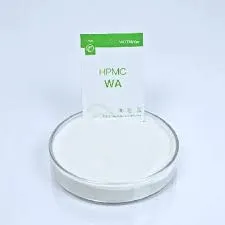
Dec . 12, 2024 09:23 Back to list
hpmc thickener
The Role of HPMC Thickener in Various Applications
Hydroxypropyl Methylcellulose (HPMC) is a versatile and widely used thickening agent in numerous industries. Its unique properties make it ideal for applications ranging from pharmaceuticals to food production, cosmetics, and construction. This article delves into the characteristics, benefits, and applications of HPMC thickener.
What is HPMC?
HPMC is a semi-synthetic polymer derived from cellulose, a natural polymer found in plant cell walls. It is produced through the chemical modification of cellulose, resulting in improved solubility and functionality. HPMC is available in various grades, differing in hydration rate, viscosity, and the degree of hydroxypropyl and methyl substitution, which allows for a wide range of applications.
Properties of HPMC Thickener
One of the standout features of HPMC is its excellent thickening ability, which can significantly enhance the viscosity of various formulations without altering their fundamental characteristics. HPMC is water-soluble, forming a gel-like consistency when mixed with water, thus providing stability and texture to products. Additionally, it is a non-ionic polymer, making it pH-stable and compatible with a wide range of components.
Moreover, HPMC offers several advantageous properties, including
1. Temperature Resistance HPMC thickener exhibits thermal gelation properties, which means it can maintain its viscosity even under varying temperature conditions.
2. Film-Forming Capability When dried, HPMC can create a flexible and transparent film, which is beneficial in applications such as coatings and adhesives.
hpmc thickener

3. Bio-compatibility As a cellulose derivative, HPMC is biocompatible and non-toxic, making it suitable for pharmaceutical applications, including drug delivery systems.
4. Emulsification Properties HPMC can stabilize emulsions, thus preventing phase separation in products like creams and sauces.
Applications of HPMC Thickener
1. Pharmaceuticals In the pharmaceutical industry, HPMC is commonly used as a binder in tablet formulations, a coating agent for controlling drug release, and a viscosity enhancer in suspensions. Its ability to form gels allows for improved bioavailability of medications.
2. Food Industry HPMC is utilized in the food sector as a thickener, stabilizer, and emulsifier. It enhances the texture and mouthfeel of sauces, dressings, and bakery products. Its low-calorie profile makes it a popular ingredient in low-fat and gluten-free foods.
3. Cosmetics and Personal Care In cosmetics, HPMC acts as a thickening agent in formulations such as creams, lotions, and gels. It improves the spreadability and feel of products on the skin. Its film-forming properties also help in creating long-lasting cosmetic products.
4. Construction HPMC is a key ingredient in construction materials, particularly in tile adhesives, plaster, and joint compounds. It improves workability, consistency, and retention of moisture, thus enhancing the performance of these materials.
Conclusion
The utilization of HPMC thickener spans a multitude of applications due to its versatile properties and performance benefits. Its ability to improve viscosity, stabilize formulations, and enhance texture makes it an essential ingredient across various industries. Whether in pharmaceuticals, food production, cosmetics, or construction, HPMC continues to play a crucial role in the development of superior products that meet consumer demands. As industries evolve, HPMC’s adaptability ensures that it will remain a vital component in formulations designed for optimal performance and stability.
-
Versatile Hpmc Uses in Different Industries
NewsJun.19,2025
-
Redispersible Powder's Role in Enhancing Durability of Construction Products
NewsJun.19,2025
-
Hydroxyethyl Cellulose Applications Driving Green Industrial Processes
NewsJun.19,2025
-
Exploring Different Redispersible Polymer Powder
NewsJun.19,2025
-
Choosing the Right Mortar Bonding Agent
NewsJun.19,2025
-
Applications and Significance of China Hpmc in Modern Industries
NewsJun.19,2025







